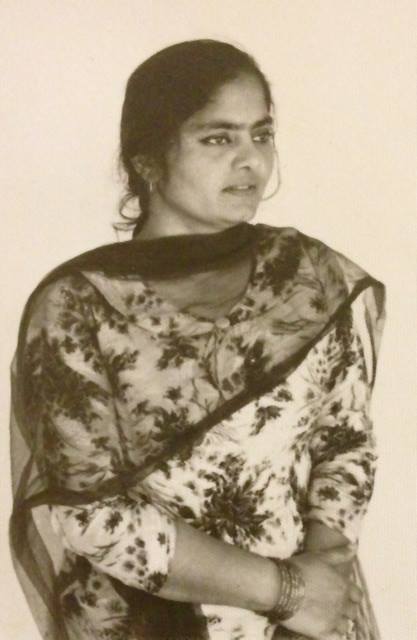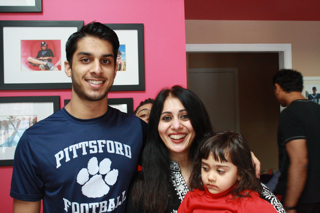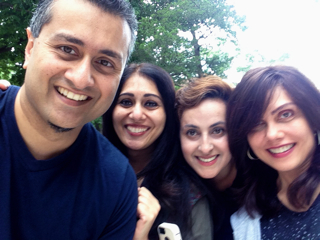Leonard Nimoy (March 26, 1931 – February 27, 2015)
Category: misc/personal
my film and film festivals…
got my voice-over recorded and finalized for the film this morning with the wonderful dave sluberski. now off to attend a Witness Palestine Film Series meeting. it’s a busy weekend!
a tribute to aunty iffie
remembering my aunt, my dad’s sister, who passed away on january 13, 2015. aunty iffie, as we used to call her, was one of the loveliest people in our family. she had this smile – warm, constant, irrepressible – it defined the contours of her personality. that’s the only way i can picture her: beaming smile, infinite kindness, not a harsh word to anyone. although my aunt had her share of challenges in life, nothing could put a dampener on her joie de vivre. she was loving, resilient, light-hearted. she tread gently on this earth. it’s not a quality that’s appreciated enough in modern times. the loud and aggressive get more attention. yet it’s exactly what we need most. i will miss her sweet sunniness. “surely we belong to god and to god shall we return.” may you rest in peace dear aunty iffie and may heaven smile on you forever.
off to paris and nice
checking out branca’s at bushnell’s basin
so grateful for my family
wonderful dinner with wonderful friends
Colonialism is a form of vampirism
Monica Sjoo and Barbara Mor: Colonialism is a form of vampirism that empowers and bloats the self image of the colonizing empire by draining the life energies of the colonized people; just enough blood is left to allow the colonial subject to perform a day’s work for the objective empire. And these drained energies are not only of the present and future, but of the past, of memory itself: the continuity of identity of a people, and of each individual who is colonized. No one should recognize this process better than women; for the female sex has functioned as a colony of organized patriarchal power for several thousand years now. Our brains have been emptied out of all memory of our own cultural history, and the colonizing power systematically denies such a history ever existed. The colonizing power mocks our attempts to rediscover and celebrate our ancient matriarchies as realities. In the past women have had to accept this enforced female amnesia as “normal”; and many contemporary women continue to believe the female sex has existed always and ab aeterno as an auxiliary to the male-dominated world order. But we continue to dig in the ruins, seeking the energy of memory; believing that the reconstruction of women’s ancient history has a revolutionary potential equal to that of any political movement today.
buffalo gets hit with serious snow
From Marcus Aurelius
When you arise in the morning, think of what a precious privilege it is to be alive – to breathe, to think, to enjoy, to love.
(via M. Junaid Alam)
a tribute to junaid alam
just found out that junaid alam passed away a few days ago. he was 31 years old, an incredible writer and activist. in may, i was briefly in touch with him when he shared on fb that he had been diagnosed with stage 4 cancer. heartbreaking…
…
Khury PS: Our world, and the struggle to make it a just one, lost someone great – and way too soon. I met M. Junaid Alam when we were in college. We were part of a small generation of young radicals in dark times – the immediate aftermath of the September 11, 2001 attacks and the beginning of the series of wars that the US has been fighting since. A defining part of those times was the wave of anti-Muslim racism, which had terrible consequences for Junaid’s South Asian, Muslim, and outspoken family. Always trying to seize opportunities for our side, even in bitter times, Junaid helped found Left Hook, a news and opinion website whose content was written by young radicals. To me, the most striking things about Junaid were his sharp mind and his unwavering seriousness. He devoured ideas and had an encyclopedic knowledge of the Left. I don’t remember him talking just for the sake of talking. He really wanted to know what you thought, and he wanted to know what you thought about his thoughts. He was always seeking collaborators in the fight against oppression and for liberation. Toward the end of his short life, Junaid was especially focused on writing about the experiences of Muslims in the US, and US imperialism and freedom struggles in the Muslim World. Junaid died of cancer at age 31. I am sorry, Junaid, that your passing came in such dark times in this country, for the Muslim World, and really for so much of the world. But we know that after the darkness comes the dawn. We will never forget you, and we will remember you into the promising and hopeful future. One of Junaid’s last posts on his facebook wall says so much about the kind of person he was: “You cannot choose cancer, but you can choose how to engage the dozens of people in the hospital who in ways big and small are trying to cure you and help you. Learning so much about so many inspiring, supportive, and dedicated people.”
…
A poem on cancer by M. Junaid Alam
An unwelcome interlocutor interrupted
an exchange between my brain and my back:
Its incessant bark quieted
my body’s conversational knack.
A senior’s suite of walking aides
spills out of my closet in spades.
My legs budge only when pressed hard,
like old jam stuck to sides of a jar.
This intruder resided between
the T4 and T5 spinal lumbar.
That’s where it left its mark–
just below the heart.
So after angry and impotent protestation
I started a new conversation:
for what is the heart but a verbose sage
when with fellow minds engaged?
I flash a smile, and discourse with a new universe
illuminates empty spaces within:
constellations of stars flicker, by way of smiles
and grins.
I alight on a question, and my curiosity
kicks off excited answers and laughter
that travels farther than legs will carry
and can be savored long after.
I ask ‘how is your day?’ and nurses understand
it’s no rhetorical wave of the hand.
Through more banter their loads seems to lighten,
and all our days by a little do brighten.
I am thawing out numbness
within this stubborn heart.
How much I’ll relieve is still unclear,
but I do think beginning was a good start.

weekend in canada
a tribute to my unforgettable aunt and uncle
rafique ahmed qureshi, my mamoon jaan, my mom’s eldest brother whom she loved like a father, has passed away. “surely we belong to god and to him shall we return.” he was an incredibly, intimidatingly brilliant man: well-read, articulate in a precise yet idiomatic way both in urdu and english, with a lively mind and a spectacular memory. he was born in gohana, india, in 1921. he studied at the anglo arabic college (delhi) and then at st stephen’s college (also in delhi) from where he graduated with a master’s in history. after partition, he moved to pakistan in a kafila (foot convoy) of 80,000 people. he was a young man at the time. he lived and made that momentous history. in pakistan, he worked for the railways. mamoon jaan’s house, in mayo gardens, will remain one of my most cherished childhood haunts – a sprawling mansion set amidst gardens with multicolored roses, all archways and verandas and heavy wooden doors and outdoor ceiling fans. it was magical, a place of endless adventure and discovery, a second home, something rooted and safe and permanent. that’s what mamoon jaan was like in a way. when my grandfather died leaving a large family behind, a few years after partition, it was my uncle who stepped up to the plate and took care of things and people. he made everyone feel safe.
just a couple of months before, my mom’s eldest sister, farhat razi, left us. seven years younger than my uncle, she too was an intrepid young woman involved in political activism like the rest of her family. she was a stunning beauty. my mom tells me that her school friends used to make excuses to visit their home so they could sneak a glance at her famously gorgeous sister. but my khala was beautiful inside and out. she had a kind and generous heart. when my dad was seriously injured in a car accident in 1970 and was hospitalized for 3 months, my aunt took care of me and my sister while my mom attended my dad. that’s when we started calling her mummy, just like her own kids. she had the most delightful girlish laugh even in her old age and she made the most delicious bhujias and chutneys and parathas. everything came from the heart.
“surely we belong to god and to him shall we return.” may they both rest in peace. they will be deeply missed. they both left their benevolent mark on the world.


labor day weekend with my gorgeous fam
The Logic of Israeli Violence
Greg Shupak: As Darryl Li points out, “Since 2005, Israel has developed an unusual, and perhaps unprecedented, experiment in colonial management in the Gaza Strip,” seeking to “isolate Palestinians there from the outside world, render them utterly dependent on external benevolence,” and at the same time “absolve Israel of responsibility toward them.” This strategy, Li goes on to argue, is one way that Israel is working to maintain a Jewish majority in the territories it controls so that it can continue to deny equal rights for the rest of the population.
The suppression of Palestinian resistance is crucial to the success of the Israeli experiment. But there is a corollary, which is a cyclical interaction between Israeli colonialism and US militarism. As Bashir Abu-Manneh explains, there is a relationship between American imperialism and Zionist policies. American policymakers believe that an alliance with Israel helps the US control the Middle East. So the United States enables Israeli colonialism and occupation, which in turn creates contexts for further US interventions in the region that can be used to try to deepen American hegemony. He points out, furthermore, that the “United States has been determining major economic and political outcomes” in the region since at least 1967, and that Israel plays a “crucial role in their realization. In Israel-Palestine, this has meant that force and colonial peace have alternated as main instruments of policy.” Yet all the while the main objective remains “a constant: Jewish supremacy in Palestine — as much land as possible, as few Palestinians as possible.”
What both Li and Abu-Manneh highlight is Israel’s concern with keeping Palestinians in a state of powerlessness. Driven by both its own settler-colonial agenda and by its function as an American partner in the geopolitical system, Israel strives to balance its desire to maximize the territory it controls against the imperative of minimizing the number of Palestinians living in the territories it seeks to use for its own purposes. One way to destroy any sign of Palestinian power has been on display during Protective Edge, during which Israeli violence has sought to stamp out signs of Palestinian independence — hence Economy Minister Naftali Bennett’s call for “defeating Hamas.”
The result is that Palestinians are not merely subject to extreme violence. Rather, their capacity to live autonomously in historic Palestine is being attacked. The destruction of infrastructure, as in the recent attack on the Gaza Strip’s lone power plant, is one index of that. Not only does the current Israeli onslaught end the physical existence of specific Palestinian individuals, it aims to obliterate Palestinians as a people with the capacity to live independently in their homeland. While denying refugees their legally protected and natural right of return is the most overt tactic that Israel uses to maintain its desired demographic picture, creating conditions inhospitable to the autonomous existence of Palestinians can also in the long run secure for Israel “as much land as possible, [and] as few Palestinians as possible.” Violence that abides by this logic is not unique to Zionism. It is central to settler-colonialism and finds historic parallels in, for example, the American Trail of Tears or in Canada, the clearing of the plains through the deliberate starvation of Aboriginal peoples. The meaning of Protective Edge is similar. More here.











